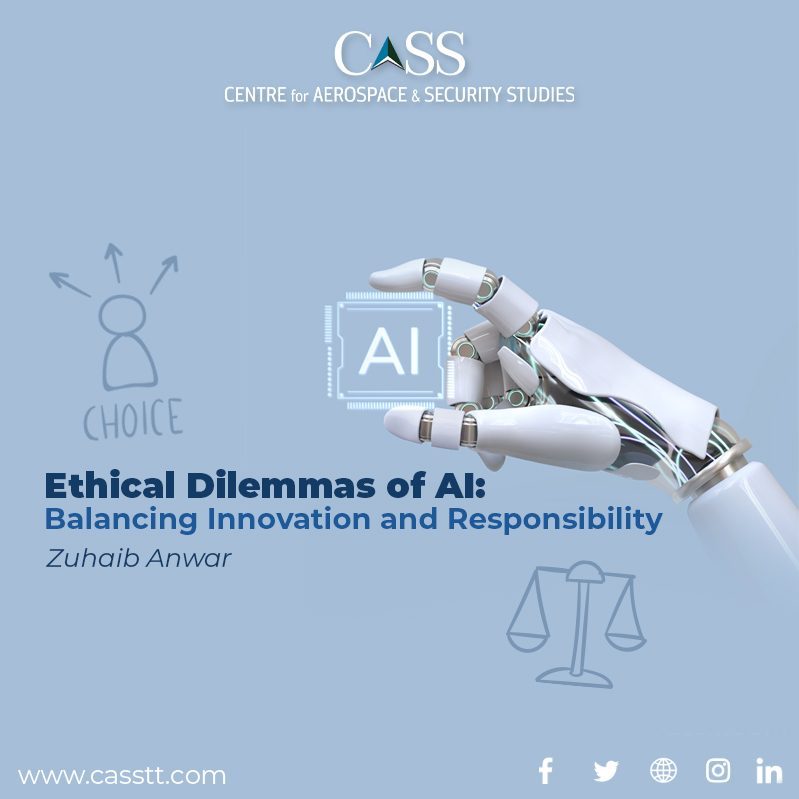Artificial Intelligence (AI) has emerged as a groundbreaking technology, reshaping the way we live, work, and interact. It holds immense potential to solve complex problems, revolutionise industries, and enhance human capabilities. Its appeal and utility are growing exponentially. Businesses around the world are spending billions of dollars on the development of AI systems and are considering its deployment an integral part of their strategy. However, amid the promises and possibilities there are serious concerns about its negative impacts as well. In a recent survey conducted by Yale University, 42 per cent of CEOs from 119 companies of Fortune 500 companies argued that AI could destroy the human race within the next five to ten years whereas 58 per cent said that the risk associated with AI was overblown. Whether AI has the potential to end our species or not, the ethical concerns surrounding its development and use are serious. The major areas of ethical concern regarding AI include bias and discrimination, data protection, privacy, and the use of autonomous weapons etc.
When it comes to the potential for bias and discrimination, AI systems learn and train by analysing past data, which might encompass underlying prejudices entrenched in the coders themselves who input specific data points. Unless adequately addressed, AI algorithms may sustain and augment these biases, ultimately resulting in inequitable consequences and prejudiced treatment across various domains including employment selection processes, criminal justice systems, and availability of essential resources. For example, an AI algorithm used to determine the credit limit for new users of Apple’s credit card gave a man 20 times more credit limit than a woman even though she had a better credit history. Similarly, AI-integrated pulse oximeters that measure the amount of oxygen in the blood used for COVID-19 patients were less accurate on darker skins than on lighter ones.
The second serious concern is regarding data protection and privacy. AI heavily relies on vast amounts of data to learn and make informed decisions. This reliance raises concerns about privacy and data protection. As AI systems gather and analyse personal information, questions arise regarding consent, data ownership, and the potential for misuse. Striking the right balance between innovation and safeguarding individual privacy is crucial because of the potential risks associated with unauthorised access to sensitive information, which can be exploited for illicit intentions like fraudulent practices or online harassment.
The rapid advancement of AI technologies has also sparked fears of job displacement and economic inequality. As AI systems automate tasks previously performed by humans, certain job roles may become obsolete, leading to unemployment and social disruption. In fact, according to a report by Challenger, Gray & Christmas last month, nearly 4000 individuals lost their jobs as they were replaced by AI. Similarly, another report by Goldman Sachs predicts that AI will replace around 300 million full-time jobs like legal, office administrative support, engineering and architecture, management, sales, etc. Therefore, it is crucial to anticipate and address these challenges proactively.
The development of AI-powered autonomous weapons raises profound moral and ethical questions. Granting machines the ability to make life-or-death decisions without human intervention challenges our notions of moral responsibility and accountability. Recently, there were reports that a United States Air Force (USAF) AI- drone killed its human operator during a simulation. Although USAF denied any such incident, it raises serious concerns about the future role of autonomous weapons.
Addressing the ethical concerns surrounding AI requires a multi-stakeholder approach involving governments, corporations, researchers, and society. Governments and regulatory bodies should establish comprehensive frameworks that guide the development and employment of AI systems. These frameworks must address ethical considerations, safeguard individual rights, and promote transparency, fairness, and accountability. Similarly, AI developers must prioritise ethical design principles and actively mitigate biases in algorithms. Incorporating diverse perspectives and interdisciplinary collaboration can help identify and rectify potential biases, ensuring fairness and inclusivity. Moreover, it is important to raise awareness about AI and its ethical implications amongst the masses. By emphasising the importance of understanding AI and promoting moral reasoning starting at a young age, we can grant individuals the ability to participate in well-informed conversations and exercise conscientious decision-making with regard to advancements in AI.
As AI continues to transform our lives, it is important to address its ethical concerns. By promoting a culture of transparency, responsibility, and inclusiveness, we can tap into the possibilities offered by AI while protecting human rights and values. Prioritising ethical deliberations during the advancement and implementation of AI is essential in order to maintain technology as a positive influence that serves humanity collectively.
Zuhaib Anwar is a Research Assistant at the Centre for Aerospace & Security Studies (CASS), Islamabad, Pakistan. He can be reached at cass.thinkers@casstt.com.




